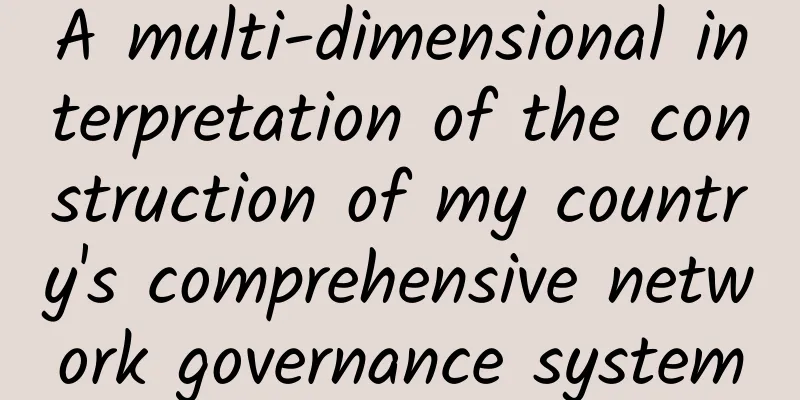A multi-dimensional interpretation of the construction of my country's comprehensive network governance system

|
At present, in the ever-changing and complex international environment, we must, from the political height of maintaining national network security, ideological security, political and economic security, and from the strategic height of promoting the modernization of the national governance system and governance capabilities, deeply understand the extreme importance and urgency of accelerating the establishment and improvement of a comprehensive network governance system, and earnestly grasp and do a good job in this work.
Strengthening Internet content construction and creating a clear cyberspace is the strategic deployment of "establishing a comprehensive network governance system" made by the 19th National Congress of the Communist Party of China. We must proceed from the perspective of network ecological system governance, adhere to systematic planning, comprehensive governance, and systematic advancement, and gradually establish a comprehensive network governance system covering leadership management, positive energy dissemination, content control, social coordination, network rule of law, technical network governance, etc., to comprehensively improve the comprehensive network governance capabilities. The comprehensive Internet governance system can be understood and interpreted from different dimensions and perspectives, especially from the multi-angle perspectives combining law, technology, discourse research and social semiotics to explore the multi-governance system of rule of law, technological governance, discourse governance and social governance. Legal Perspective The comprehensive network governance system is an important part of the comprehensive social governance system, among which the rule of law is the foundation for building a comprehensive network governance system and a concrete manifestation of the state's exercise of sovereignty in cyberspace. The rule of law is to give full play to the great advantages of the new era of socialism with Chinese characteristics under the centralized and unified leadership of the Party, to gather the strength of the whole society, and to comprehensively use a variety of means, especially to make full use of the rule of law, to govern the outstanding problems in cyberspace. my country has always adhered to the people-centered idea in the field of network and information rule of law, which embodies the fundamental legislative purpose of "network security for the people, network security relies on the people", and has made gratifying achievements in promoting the comprehensive rule of law on the Internet. In particular, the promulgation of the "Cybersecurity Law of the People's Republic of China" has laid the basic framework for China's network security protection and cyberspace governance, and its significance is far-reaching. Recently, two things happened in the field of personal information and privacy protection legislation, which are also important events in network security protection and space governance: First, the "Civil Code of the People's Republic of China (Draft)", the first code in New China, was submitted to the National People's Congress for deliberation. The Civil Code has made personal rights a separate chapter, and has especially strengthened the protection of natural persons' privacy rights and personal information; Second, the "Personal Information Protection Law" has been included in the first category of legislative projects in the "Legislative Plan of the Standing Committee of the 13th National People's Congress", which promptly responded to the urgent needs of the general public for the protection of personal privacy and information rights. Technical perspective Strengthening the use of technology to govern the Internet and improving the technology governance system are also important links in building and improving my country's comprehensive Internet governance system. In recent years, my country has done a lot of work in building a manageable, controllable and trustworthy technical security system throughout the life cycle, organically integrating network technology into the comprehensive Internet governance system, and using technical means and measures to monitor, defend and deal with network security risks and threats at home and abroad. my country's Cybersecurity Law stipulates that the state shall take measures to monitor, defend and deal with cybersecurity risks and threats originating from within and outside the territory of the People's Republic of China, protect key information infrastructure from attacks, intrusions, interference and destruction, punish network crimes in accordance with the law, and maintain the security and order of cyberspace. The National Security Law clearly states that the state shall strengthen the construction of independent innovation capabilities, accelerate the development of independent and controllable strategic high-tech and core key technologies in important fields, strengthen the use, protection and scientific and technological confidentiality capabilities of intellectual property rights, and ensure the security of major technologies and projects. With the development of the Internet, especially mobile Internet, the social governance model is shifting from one-way management to two-way interaction, from offline to online and offline integration, and from simple government supervision to a greater focus on social collaborative governance. We must deeply understand the role of the Internet in national management and social governance, and build a national integrated big data center with the promotion of e-government and the construction of new smart cities as the starting point, and use data concentration and sharing as a means to promote technology integration, business integration, and data integration, and realize cross-level, cross-regional, cross-system, cross-departmental, and cross-business collaborative management and services. The perspective of discourse power The Fifth Plenary Session of the 18th CPC Central Committee proposed to enhance my country's institutional discourse power in global economic governance and build a broad community of interests. Institutional discourse power is a powerful guarantee for participating in and leading the reform and construction of the global governance system. Since the concept of "institutional discourse power" was proposed, its development and application have been extensive and multi-dimensional, and have been applied to various fields of economic and social development, including institutional discourse power in economic governance, institutional discourse power in cybersecurity rules, and institutional discourse power in international information and communications. At present, the formulation of international law is also undergoing a period of change, and has expanded from traditional fields such as diplomacy, territory, treaties, space, and the environment to emerging fields such as AI, digital economy, and cyberspace. Therefore, China's participation in the formulation of international rules needs to be innovative and strengthened in terms of concepts, and a higher sense of mission and initiative should be used to help the country gain more voice in maintaining international rules. International cyber governance rules directly affect the distribution of interests among countries and determine the role a country plays in international cyberspace. Although my country's information, communication and Internet industries are developing at an astonishing speed, their advantages are more reflected in business model innovation and market capacity. Compared with developed countries, there is still a large gap in technology research and development, especially in network facilities, technology, and security. Developed countries have always used standards and rules to build their "moats". China must participate in the formulation of relevant international cyber governance rules at a higher level to prevent being controlled by others in the future. Semiotic Perspective As a symbolic system, cyberspace is open, dynamic, temporal, spatial and social due to its interactive, rapid, shared, global and unpredictable characteristics. The openness and dynamism of cyberspace implies its spatiality and temporality: in terms of spatiality, it means that different countries or regions have different definitions of cyberspace, which need to be deconstructed to clarify its meaning; in terms of temporality, it means that cyberspace can change with the changes and transformations of historical and social conditions. This provides us with a theoretical framework to explore the process of changes in my country's comprehensive network governance system with the changes in historical and social conditions from a historical perspective, and to explore the roles played by different governance subjects (government, enterprises, industry organizations, international organizations and citizens) and the similarities and differences in the comprehensive network governance systems of different countries from a synchronous perspective. As a digital symbol system, cyberspace is also social. Social semiotics focuses on symbolic activities that are interconnected in different ways in a specific social context, emphasizing the important role played by society and culture in the process of symbolic meaning construction, as well as the interaction between various subjects in the process of symbolic meaning construction. In the governance of international cyberspace, the synergy of various subjects should be fully utilized. The governance subjects include multiple subjects such as governments, international organizations, industry groups, enterprises and netizens. The ultimate goal of governance is not only the "artifacts" such as the information content layer, basic physical layer and digital code layer of cyberspace, but also to create a clean and upright cyberspace ecological space that is in line with the interests of people of all countries through a comprehensive governance system, so that the network can benefit mankind. This is also the core value of China's "people-centered, Internet and information industry benefiting the people" and "building a community of shared future in cyberspace". |
<<: Fixed-line broadband rates drop again, how should operators respond?
Recommend
The champion of Huawei Elite Competition is about to be announced. Who will win the highest title of Huawei ICT Talent?
In a few days, the finals of the two exciting eve...
A thorough investigation of the history behind Huawei's high-quality Wi-Fi ONTs
[51CTO.com original article] Only after careful c...
my country's total 5G base stations account for more than 60% of the world's total
The 2021 Communications Industry Statistical Bull...
Bluetooth, WiFi and ZigBee: Which of these three wireless transmission technologies will dominate the world?
[[277331]] There are more and more smart products...
LowEndTalk (LEB) 2020 Low-End VPS Voting Ranking
A few years ago, LET often carried out voting act...
Lenovo Debuts at Microsoft IoT Conference, Driving Business Intelligence Innovation with Smart IoT Devices
On December 3, the highly anticipated 2019 Micros...
What Data Center Operators Need to Know About Expanding to 400GE Networks
Today, many data center operators need to expand ...
Major challenges and development trends of data center network technology in Internet projects
The network is the most stable part of the data c...
Mid- and low-frequency refarming is used to accelerate 2G/3G network withdrawal from 5G
Recently, the Ministry of Industry and Informatio...
6 steps to effective real-time monitoring across hybrid IT
For data center operations, it can be difficult t...
5 blockchain trends for 2018
Few new technologies have generated as much discu...
The computing power network has its own calculations
In recent years, the wave of digitalization has c...
Yike Cloud: 10% off monthly VPS and 20% off quarterly VPS, starting from 64 yuan/quarter for CN2 lines in the United States/Japan/Hong Kong
OneTechCloud launched a new promotion in March, o...
The current dilemma facing 5G: alarming power consumption and slower-than-expected base station construction speed
Have you changed your phone to 5G? My 4G is enoug...
McKinsey: These ten trends are enough to subvert the existing IT infrastructure
When it comes to hardware and IT infrastructure, ...









